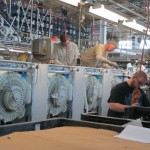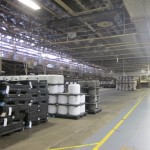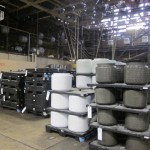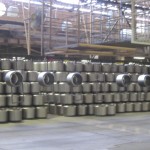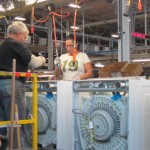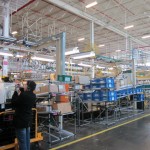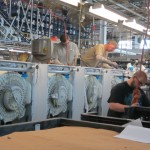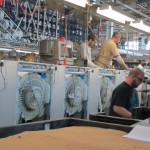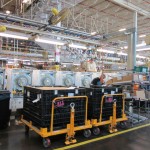It’s the last leg of our tour. In confirmation of the fact that everything in America is outsized for us Europeans, we enter the largest washing machine factory in the world. In Clyde, they manufacture one every 4 seconds.
In Ohio, Whirlpool has another five production units, with a total of 10,000 employees. This factory has been running since 1880, and in 1952, the corporation purchased the company Clyde Porcelain Steel. Only last year did production of front-loading washing machines begin. One factory, with 5 million pieces per year, and over 70% of the top-loading washing machines present in American homes are produced here. To date, 145 million washing machines have been produced. Three thousand four hundred people work in Clyde, and more than half of them have over 20 years of service. The most important qualities of this factory are a strong organizational ability, great motivation and work ethic, and a structure with a potential for very flexible expansion. There is a strong social sense, and, over the last three years, over $1,400,000 has been donated to a variety of causes in the area. Many of us do voluntary work, and collaborate on social activities. The factory extends over an area equal to 55 football pitches. There are dozens of production lines, and it is impressive to see pieces of washing machine flying overhead, converging on assembly areas. Today, a lot of focus is put on saving energy, starting with water. “In the past, a wash took 80 gallons, now, 15-16 is sufficient,” Bill explains to us. The whole of the manufacturing process is done in Clyde, including working the metal and the plastic “This is a de-unionized factory,” Bill tells us as he accompanies us to see the various production phases. And this fact is confirmed also by the director and the head of personnel. “Basic pay is about $18/hour, to which a number of benefits are added, like health care and social security, which the company guarantees.” The salary is established from an analysis of the market, which is made annually, on both a national and a local basis. This is a different system from the one in Italy, and comparisons are difficult. And the feeling of belonging is also different, which is accepted, for good and bad.

